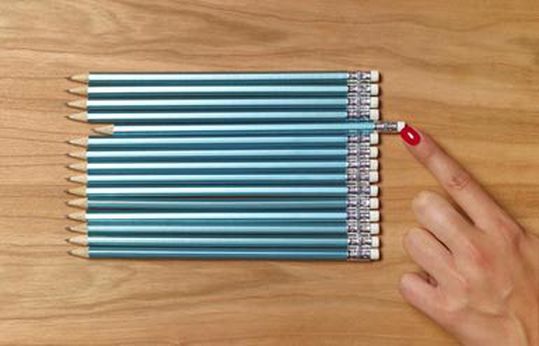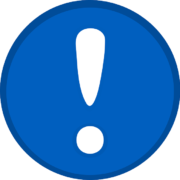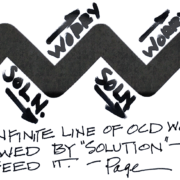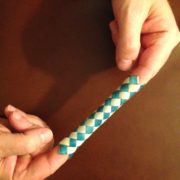First off, stopping the panic and anxiety that results from obsessive-compulsive disorder (OCD) is no easy task, and all of the self-help books, gurus, and mental health experts out there worth a darn will acknowledge this fact. And there is no one right way to accomplish this, but there are some generally tried and true methods to self-calm in the moment.
In general, let up with the naming of your episodes as ‘panic attacks’ and label them with a nice boring name like ‘inappropriate response syndrome.’ It causes less emotional arousal and drains a bit of the drama away from the disorder, making it feel a little bit more manageable.

When the obsessive thought hits, you will be able to mutter to yourself, there it is–my boring, old inappropriate response syndrome come-a-calling again. Every reframe will dampen the impact of the emotion felt.
Next, whatever the obsessive thought is, label it first. Give the credit for the thought to your OCD, without blaming yourself. Say “I have this thought because of a medical condition, OCD.” It is as if your brain has a manual transmission vs automatic, unlike most people who don’t have to consider the best action to take. You must mindfully change gears from your thought and the compulsive action it demands of you (frequently washing hands is a common example with the perception that germs are everywhere and will make you sick if you do not constantly wash) to a different response.
You don’t get rid of the thought; in fact you cannot. But you can start with a delayed response to it. Challenge the thought to do its worst within say, 20 seconds. “Bring it!” you say. And use a slooow count to 20 in your challenge. Then try working up to a 15 minute delay, gradually increasing it from there.
This is a notably different response than immediately bowing to the command of your thought. Your goal is to control the responses to the thought and urges, not to control the thoughts themselves. That is not possible, so don’t even try.
Next up is to refocus since you have successfully delayed your usual response. Hobbies are good. Or you may decide to take a walk, read, listen to music, or sing out loud to a favorite tune. Any constructive pleasant behavior will do. Make a grocery list. Clean out a junk drawer. In fact, having a short list of possible activities in mind ahead of time is helpful. This is where I like to point out refocusing is the most difficult step, but vigilant practice at this will actually rewire your neural pathways towards future better responses. If you want to read more about this, an older but excellent and easy read is Brain Lock by Jeffrey M. Schwartz, M.D.
So, mindful labeling, delayed responses, and refocusing will produce the end result of revaluing your OCD thoughts. It will reduce them to a place in your life where you rule them instead of the other way around. And that, dear friends is the goal—to lead a more fulfilling life devoid of the constant anguish OCD brings to its sufferers.











I liked how you wrote that a nice boring name for your attack can make it feel a little bit more manageable. My friend wants to take an OCD outpatient treatment program. I should advise him to go for it to overcome the condition.
What a wonderful post, you have put quite a lot of effort into this one, I can tell. Love everything about this, great post. Hope to see more such posts from you soon.